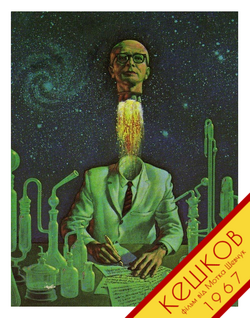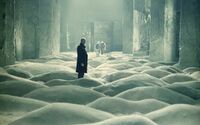Keshkov
This article is incomplete because it is pending further input from participants, or it is a work-in-progress by one author. Please comment on this article's talk page to share your input, comments and questions. Note: To contribute to this article, you may need to seek help from the author(s) of this page. |
| Keshkov | |
|---|---|
 Theatrical release poster | |
| Directed by | Motka Shevchuk |
| Written by | Pavlusha Plyushenko Vanechka Andrushko Marek Podzel Motka Shevchuk |
| Screenplay by | Anechka Gryglewicz Isaak Smirnov |
| Produced by | Anisim Vlasov |
| Starring | Ilya Nepyipyvo Akim Kluka Johanna Salminen Malkhazi Giorgadze Sonya Alexeeva |
| Cinematography | Sasha Malarenko |
| Edited by | Yakim Kuzmin |
| Music by | Ioann Pogrebinskiy |
Production company | |
| Distributed by | Kapfilm (UPSR, RV, TNG, REA, SRS) Halkett Pictures (EC) |
Release date | August 8, 1967 |
Running time | 164 minutes |
| Country | Soravia |
| Language | Soravian |
| Budget | €600,000 |
Keshkov (Soravian: Кешков; Keshkov, sometimes solarianised as Kyeshkov) is a Soravian dystopian science fiction film directed by Motka Shevchuk and released in 1967. The film was written by Pavlusha Plyushenko, Vanecha Andrushko, Marek Podzel and Shevchuk himself. Shevchuk's second film, it largely expanded upon his preferred long cinema, and retained creative artful shots seen in his debut film, The Suitcase, molded into a science fiction setting.
Set on the eponymous fictional planet, Keshkov tells the story of a scientist who is sent to document a seemingly uninhabited planet, told to be outside of the known solar system. After several weeks on the planet, the scientist notices strange occurrences happening during his daily routine. After some time, the scientist encounters Trinity, the super-intelligent technological system that inhabits the planet, able to achieve and comprehend things far beyond human capabilities. The scientist begins to study the machine, but is slowly driven to insanity as the machine begins to destroy his life and his mind.
Keshkov employs common sci-fi themes such as space exploration and extraterrestrial encounters, but also explores real-world topics such as epistemology, the value of knowledge and also dementia. The film had a successful release across Euclea, where it became an influential and pioneering sci-fi film, whose influences on filmmaking continued well into the 1970s. In the year of its release, it won the béco aurèo at the 29th Montecara Film Festival, becoming the first Soravian director to win the award.
Plot
On a dark and foggy street, a man, covered in shadow, walks hurriedly in a large black trenchcoat towards a dull, concrete block of flats in an unnamed city. Visibly stressed, sweating and heavily breathing, he reaches into his cupboard and takes a large swig of a half-empty bottle of cheap whisky. The screen fades to black. The film re-opens in a lab, showing the same man, this time conducting experiments in a laboratory. The Scientist (Nepyipyvo) gestures to his diligent assistent, The Auxiliary (Kluka), and it is made clear the two are well-acquainted with each other.
One day, the two are visited by a party or company official (Giorgadze), requesting that The Scientist relinquish his duties in his lab to embark on a classified scientific mission to observe extra-terrestrial planets. He agrees, and is driven to a large futuristic facility where he meets other like-minded aspiring scientists, all dressed identically in white spacesuits. After changing, The Scientist is directed towards a small space pod, which he will use to travel to his assigned planet, Keshkov.
He travels with the pod's driver (Alexeeva) to the planet, using faster-than-light travel to reach their destination. After disembarking on the planet, he nods at the driver before the pod shoots back into space. A lab greets The Scientist upon the planet, with living quarters and amenities befit for a normal house. He is tasked with observing and documenting the planet's environment and any signs of life he may find there. The Scientist struggles to cope with his alcoholism on the planet and has several breakdowns in the first week of his stay. In the second week, he begins to notice strange occurrences occur around his lab, his quarters and outside. He is suddenly rid of his alcoholic cravings, but begins to feel an unshakable feeling of dread at all times.
The Scientist finds himself writing incoherent pages for hours with no recollection of doing so, and he quickly loses the notion of time as his daily routine is shattered by his continuous mind blanks. He eventually encounters Trinity (voiced by Salminen), a super-intelligent machine that inhabits and controls the planet. Possessing intelligence beyond human comprehension, Trinity has been slowly driving The Scientist insane by manipulating his mind. After meeting the machine, his disintegration quickens and he loses all semblance of identity and reality. The Scientist eventually destroys his quarters, lying eyes wide open on a ripped pile of papers and electronic rubble as the camera spirals upward.
The film ends as a pod driver visits the planet, hoping to find The Scientist and return to him to Earth to consolidate his findings from his mission. He walks across the desolate landscape, eventually finding his lab, lying spotless and fixed with no sign of human inhabitation.
Cast
- Ilya Neypyipvo as The Scientist
- Akim Kluka as The Auxiliary
- Malkhazi Giorgadze as the official that visits The Scientist in his lab
- Sonya Alexeeva as the first pod pilot
- Johanna Salminen as the voice of Trinity
Production
Writing
The film's script was predominantly written by Soravian authors Pavlusha Plyushenko and Vanechka Andrushko, with minor input from Vynich author Marek Podzel and directorial input and revisions by Shevchuk himself. The script or setting of the film was not based solely on any novels, but Shevchuk took large inspiration from famous science-fiction authors of the time, as well as the writing methods of many famous directors of the 1930s and 1940s.
The script took around two years to fully write and polish, with Plyushenko describing the writing process as "incredibly arduous" due to Shevchuk's "obsessive perfectionism". In 1980, Andrushko revealed that they had been halfway done with a previous script before Shevchuk deemed it unsatisfactory and requested a new one to be drafted and written.
Direction

Filming for Keshkov began in October 1965, and concluded with the filming of the final scenes of Keshkov in West Miersa in November 1966. Filming was mostly staggered into three main blocks (October 1965–December 1965, April 1966–August 1966 and October–November 1966), though other smaller scenes were filmed during this time. Hundreds of civilians were cast in the film as background characters, particularly in the space facility, where over 300 were on set at one time. Most of the civilians in the film were unpaid volunteers.
The film was shot entirely in colour, utilising over 4,500 metres of film to achieve its 2 hour 44 minute runtime. Its length made it the longest commercial colour film in Soravian history, and its length of film made some smaller cinemas unable to show the film.
Production of the film was done by Novira, led by Soravian producer Anisim Vlasov, with additional screenplay by Anechka Gryglewicz and Isaak Smirnov. Sasha Malarenko led the film's cinematography and Yakim Kuzmin was the film's main editor.
Locations
Nearly all of Keshkov was filmed domestically with Shevchuk's low budget. Much of the film was filmed in Seiresk, Samistopol, due to its abundance of concrete buildings and apartment blocks.
- The opening scene where The Scientist walks down the foggy street, as well the apartment he enters, were filmed in the city of Seiresk.
- The Scientist's lab was filmed in unused back rooms of the recently-opened Kamenka Cosmomuseum, also in Seiresk.
- The futuristic facility The Scientist is taken to to begin his mission was filmed in an undisclosed factory in Samistopol, with special effects used to make the building look more suited to science fiction.
- The first scene of The Scientist on Keshkov was filmed in the Great Western Plain in Zalykia.
- Other Keshkov scenes were filmed were filmed in the Miersan Basin, and the Vikna valley in Lushkina.
Music

The film score for Keshkov was composed by Ioann Pogrebinsky, who had worked with Shevchuk prior, also composing the soundtrack for his debut film, The Suitcase. As a director, Shevchuk enjoyed using film score to evoke moods throughout the film, and this concept was expanded upon in Keshkov, with prolonged scenes often lasting for several minutes with no dialogue, simply the score backing the scene.
Pogrebinsky's score was mainly comprised of various aspects of modern classical, incorporated with prior techniques of musique concrète and various other field recordings that he either found or created himself between 1960 and 1966, later released on their own as The Voice of Cinema: The Pogrebinsky Recordings, 1960–1966, consisting of urban noises as well as beeps and various other sounds he labelled as "virtual, digital and futuristic". His score influenced many other film soundtracks of Soravian cinema in the 1960s and 1970s.
The soundtrack was inducted into the Soravian National Archives as a "significant historical piece of artwork" in 2014.
Themes
Dementia
Epistemology and the pursuit of knowledge
Critical reception
In Soravia
Internationally
Box office
Accolades
| Award | Category | Recipient | Result |
|---|---|---|---|
| Borzhava Film Gallery | Best Film | Motka Shevchuk | Won |
| Best Director | Won | ||
| Best Cinematography | Sasha Malarenko | Nominated | |
| Best Soundtrack | Ioann Pogrebinsky | Won | |
| Best Screenplay | Anechka Gryglewicz, Isaak Smirnov | Nominated | |
| Inoka Film Festival | Best Director | Motka Shevchuk | Nominated |
| Best Actor | Ilya Neypyipyvo | Nominated |

